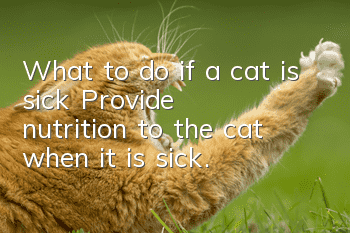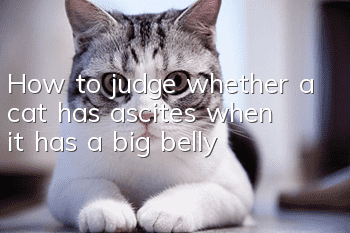What to do if a cat is sick? Provide nutrition to the cat when it is sick.

In the process of raising cats, it is inevitable that the cat will get sick. It is okay if the cat is sick and does not affect its appetite. If the cat does not eat when it is sick, the owner must be worried. After all, nutrition mainly comes from food, and it has never been eaten. If you eat, your resistance will decrease and you will lose weight. Even if the disease is cured over time, the cat’s body will not be able to bear it. So what should you do if your cat is sick? Let’s follow the editor of Chongqing.com to find out.
1. Most cats will lose their appetite when they are sick
Most cats will have their digestive function affected when they get sick, often showing symptoms such as loss of appetite, even not eating or drinking, vomiting, diarrhea and other symptoms. If easy-to-digest, nutritious, and delicious food, especially adequate drinking water, are not provided in a timely manner, it can lead to a series of functional disorders, acidosis, heart failure, and even death in cats. Therefore, to strengthen the dietary care of sick cats, we must first provide sufficient drinking water.
Put a little salt in the drinking water (0.9 grams of salt in 100 ml of water) to maintain the balance of water and salt metabolism in the cat's body. If the cat is sick and refuses to drink water, it can be fed with a small rubber ball, plastic bottle or syringe, but be careful not to act too hastily to avoid choking on the water. If your cat is sick and severely dehydrated, fluids may be needed to completely resolve the problem. Cats with digestive system diseases should be given delicious and easy-to-digest liquid food, such as egg soup, broth, milk, rice soup, sugar water, etc. These foods are easy to digest and are more suitable for feeding sick cats, but their mineral and vitamin content are not high, so these substances should be added appropriately when feeding.
2. Provide nutrient cream to cats when they are sick
Nutrient paste is a very good supplement. The ingredients contained in it can be completely absorbed by cats. It is very suitable for supplementing nutrition for seriously ill cats. Nutritional paste is also relatively comprehensive in nutrition, which can help cats regain their physical strength as soon as possible, and the dosage is not very large, making it easy for cats to fill up when they don’t eat. The nutritional pastes on the market now are all imported, and the prices are also very high. Here is a simple nutritional paste formula that owners can make by themselves. The owners can make it for cats to eat. In normal times, they can also occasionally provide it to cats for use. Cats are more beautiful and healthier.
1 part fresh milk, 1 part evaporated milk (also called light cream, available in food stores, canned), 1 raw egg yolk, 1 cod liver oil (squeeze the capsule and add the oil to the mixture), if possible, add 1 Add gamma globulin (increase resistance), add appropriate amount of glucose powder and mix evenly. This formula can also be used as a substitute for cat milk for newborn cats.
3. Pay attention to the cat, there will be signs before the cat gets sick
1. Mental state: Cat illness often manifests itself as listlessness, a tendency to lie down, and dull or half-closed eyes. Slow response to sound or external stimulation. The more serious the condition, the weaker the reaction, and even appearDrowsiness and loss of various reflexes such as the pupil's reflection of light. Some may have an opposite mental abnormality, that is, the cat is excited and restless, spinning in circles, biting, barking, manic, etc.
2. Nutritional status: When cats are sick, their coats are often rough, dry, lack luster, emaciated, and weak. A healthy cat's coat is usually smooth and shiny, and its muscles are plump and strong.
3. Body temperature: In addition to measuring it directly with a thermometer, under normal circumstances, you can observe the end of the cat's nose. If the nose is dry, it is a sign of increased body temperature. In addition, changes in ear base and body surface temperature can also be used as a reference for body temperature. Once a cat's body temperature rises, it is often accompanied by thirst, lack of energy, slow movement, loss of appetite, etc.
4. Posture: Abnormal posture of a cat when standing, lying, walking, or jumping is also a symptom of cat illness. For example, cats with pain in their limbs tend to limp when walking and have incorrect posture when standing. When cats have abdominal pain, they often curl up with their heads under the abdomen and lie in abnormal postures.
5. Breathing: If the number of breaths increases or decreases, and at the same time you have difficulty breathing, dilated nostrils, or even mouth breathing, or abdominal incitement, it means you may be suffering from respiratory disease or other systemic diseases. However, attention should be paid to the changes in the cat's normal physiological breathing caused by changes in season, temperature, and activity level.
6. Drinking water and appetite: Cats generally show varying degrees of anorexia and refusal to eat when they are sick. Of course, you should pay attention to the difference between cats’ picky eating habits and the amount of water they drink. For example, cats often drink more water when they have fever or diarrhea and are dehydrated, but when they are seriously ill or severely exhausted, they drink less water or even stop drinking.
4. When cats are sick, they should be initially diagnosed and treated as soon as possible
1. Changes in the abdomen: The cat’s abdominal circumference increases, the abdominal wall becomes tense, and it sounds like a drum when percussed, which is a sign of flatulence. On the contrary, if the abdominal circumference is reduced and is sensitive to touch, it may be peritoneal infection or abdominal pain.
2. Oral diseases: The normal mouth color of cats is light pink. A cat's mouth will turn red when it has a fever, pale when it is anemic, burnt yellow when it has liver disease, and bluish-purple when it is seriously ill. In addition, you should also pay attention to the cat’s oral secretions, tongue coating, gums, cheek mucosa, and throat for blisters, ulcers, swelling and other abnormalities.
3. Changes in the nose: A normal cat’s nose is cool and moist. It is abnormal if the cat's nose is hot, dry or even cracked. In addition, cats rarely have runny noses, and if there is an increase in nasal discharge, it may be a sign of a certain disease.
4. Detect cat ear diseases in time: Cats’ ears move freely and respond sensitively to sounds, but the opposite is true when a cat is sick. In addition, you should pay attention to whether there are secretions, scabs and other abnormalities inside the cat's ears.
5. Pay attention to vomiting in cats: Cats not eating when they are sick are just a minor symptom. Cats are particularly prone to vomiting when they are sick. Cat vomiting can be divided into two types: pathological and physiological vomiting. Physiological vomiting isA protective reaction, generally only vomiting once, is normal, but if it is caused by certain viral diseases, gastrointestinal diseases, fever, colds, pneumonia, liver disease, food poisoning, foreign bodies in the stomach, parasites or gastric Repeated vomiting caused by bleeding, ulcers, etc. should not be taken lightly.
6. Cat coughing and sneezing: Cat sneezing is often a sign of catching a cold or catching a cold, while coughing indicates the possibility of lung or respiratory infection.
7. Observe cat feces: Under normal circumstances, cats’ feces defecation frequency, feces shape, quantity, smell, and color are relatively stable. If the stool is dry, hard, sparse, dark in color, and often contains a small amount of mucus, it may be a sign of fever, constipation, or chronic gastroenteritis. If the stool is soft, shapeless, or watery, or even mixed with mucus, pus, blood, bubbles, etc., it indicates a serious condition.
When a cat is sick and refuses to eat, you should take the cat to a professional pet hospital for treatment in time. If there is no pet hospital near your home, try to consult some pet doctors. Sick cats are very fragile. The owner should take good care of the sick cat at the same time. , try to provide the sick cat with nutrition and give certain treatment. I believe that the cat will naturally recover after a period of time.
- The cat keeps meowing at the door at night
- What are the precautions for training Havana cats? A novice’s guide to raising cats!
- Why do cats love licking their fur so much?
- Things to note when raising cats: Cats’ “glass stomach” cannot be ignored
- How do puppets get hairy cheeks?
- What are the symptoms of pregnancy in hairless cats? What are the symptoms of pregnancy in hairless cats?
- Revealing the reasons why Persian cats are sold at low prices
- How to quickly stop diarrhea in cats
- What should kittens eat that is easy to digest?
- Is it hot when a cat sticks out its tongue?



